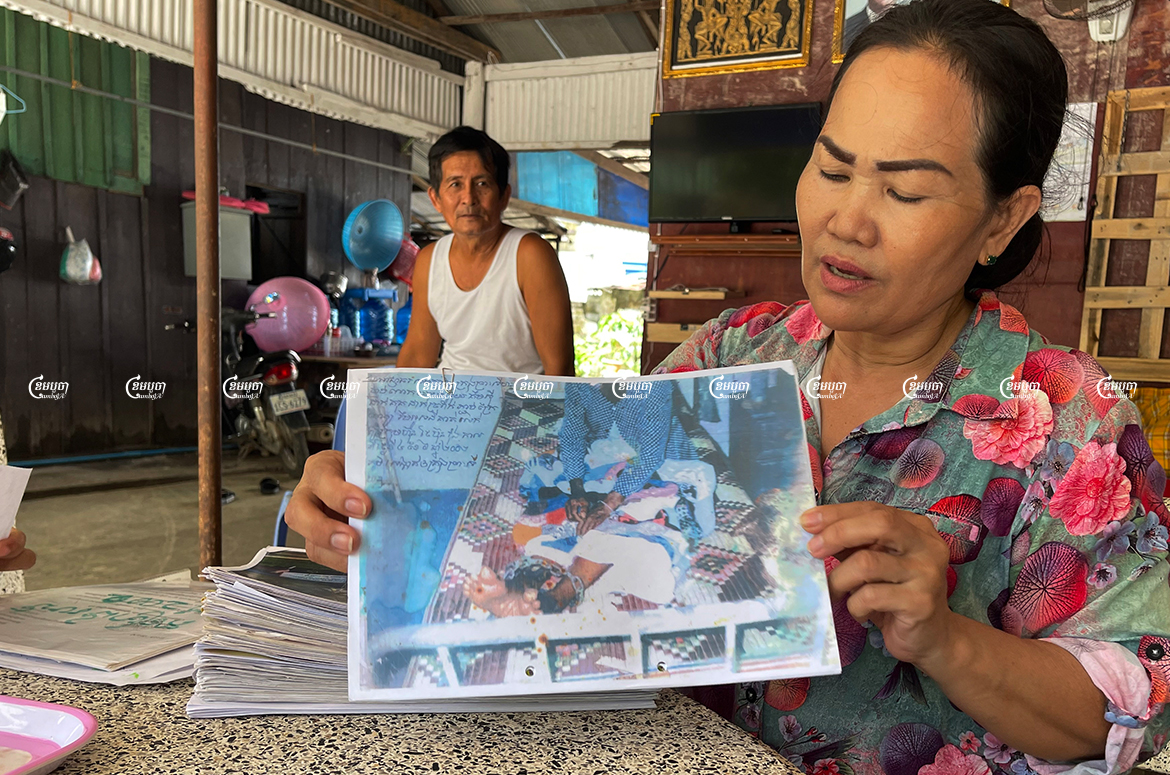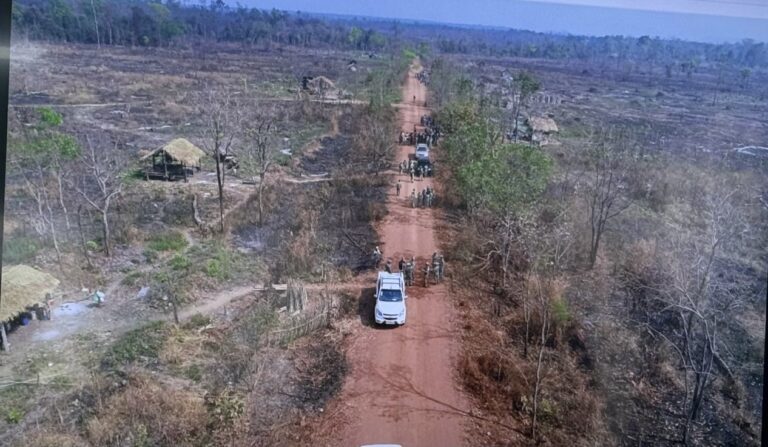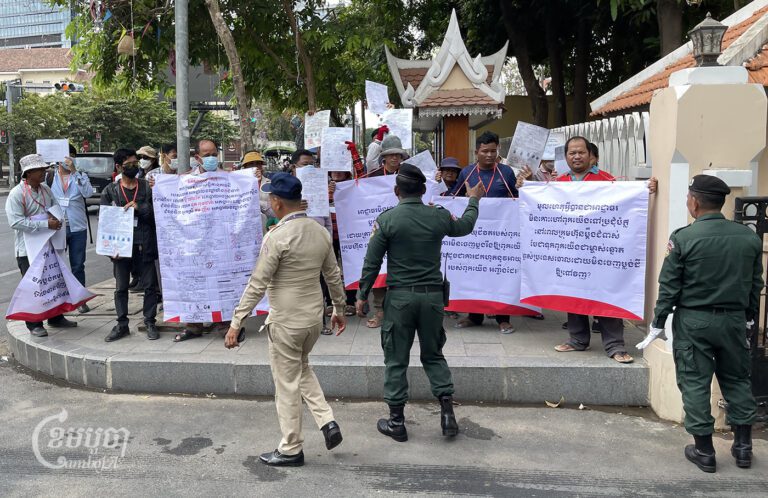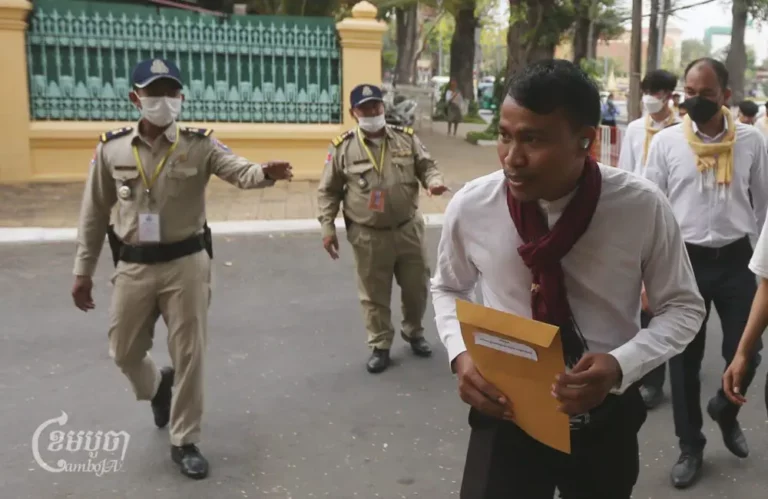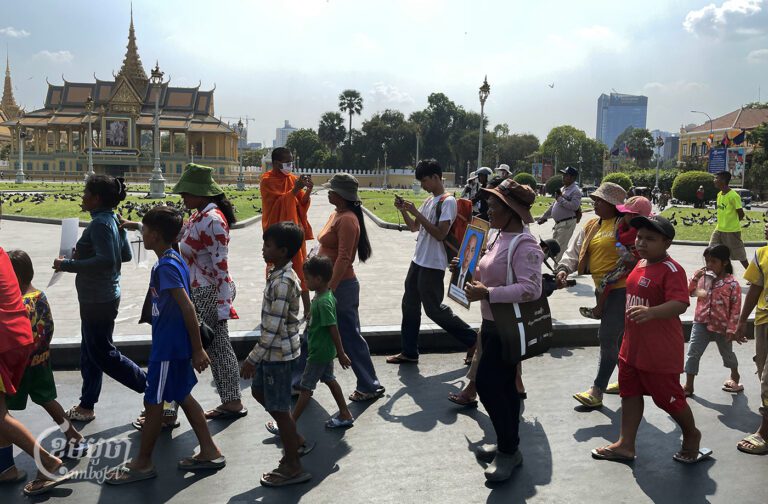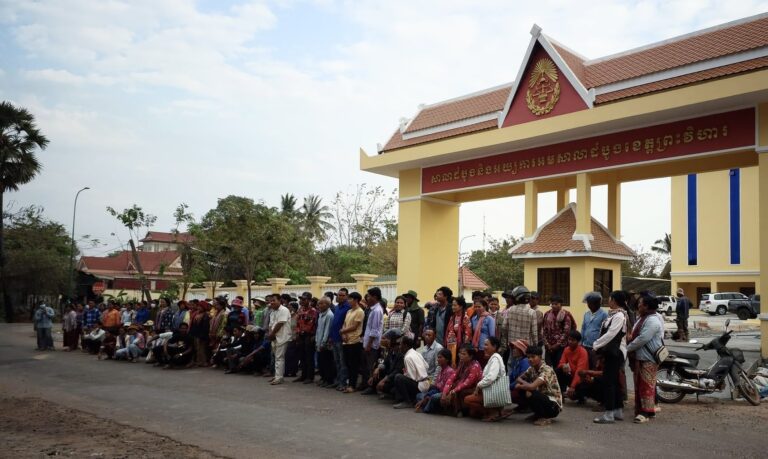Preah Sihanouk Province: The longest-running land dispute in Preah Sihanouk province has spanned 25 years and a full-scale urban transformation. But for the villagers embroiled in the conflict, who have seen forcible eviction, displacement and, for some, imprisonment, the fight is far from over.
The villagers, numbering 24 families in the city of Sihanoukville, have seen about five hectares of what they insist is their land become prime real estate in the city’s haphazard construction scene. Located near the seaside and surrounded by Chinese-owned casinos, freshly built roads and about a dozen unfinished high-rise buildings, the disputed land has been fenced off plot-by-plot since the dispute began in 1996.
Back then, according to the villagers, their families had been accused of squatting on state land and were evicted without compensation. Rights to the land were then granted by provincial authorities to the Thai Boon Roong Group development company, which held the land but never built on it.
At that time, Sihanoukville was still a relatively quiet town. But today, after the city’s construction boom and transformation, property in Village 1 of Commune 3 is now estimated at a value of about $3,000 per square meter, in large part due to the influx of Chinese investment since 2018.
The red-hot real estate market has further complicated the ongoing land dispute, which has seen the imprisonment of a dozen villagers since 2002. What’s more, as the officially recognized ownership of the property has reportedly passed between different hands since first being granted to the Thai Boon Roong Group, the affected families in Village 1 don’t even have a clear sense of who now officially owns the disputed land. Now, a leader with rights group Licadho says the dispute is the longest-running in Preah Sihanouk province, which as a whole has emerged as a hotspot for land conflicts due partly to the rapid pace of development there.
Hang Chinda, 55 years old and a representative of the affected families in Village 1, has been jailed twice due to the dispute. In July, she was released from prison after serving a two-year sentence passed down to her for a conviction of incitement and extortion following a village protest in 2019. Now, Chinda said she’s updating her documentation and seeking new interventions from government officials. Most of all, she said the 24 families will continue to fight until the end.
“We continue to seek intervention from relevant ministries and Samdech Techo because we believe that so far, this case has yet to reach him,” Chinda said, using an honorific title for Prime Minister Hun Sen. “I know the hope is too far, but I still continue because I believe that a country with rule of law would bring true justice for me one day, I still fight for it.”
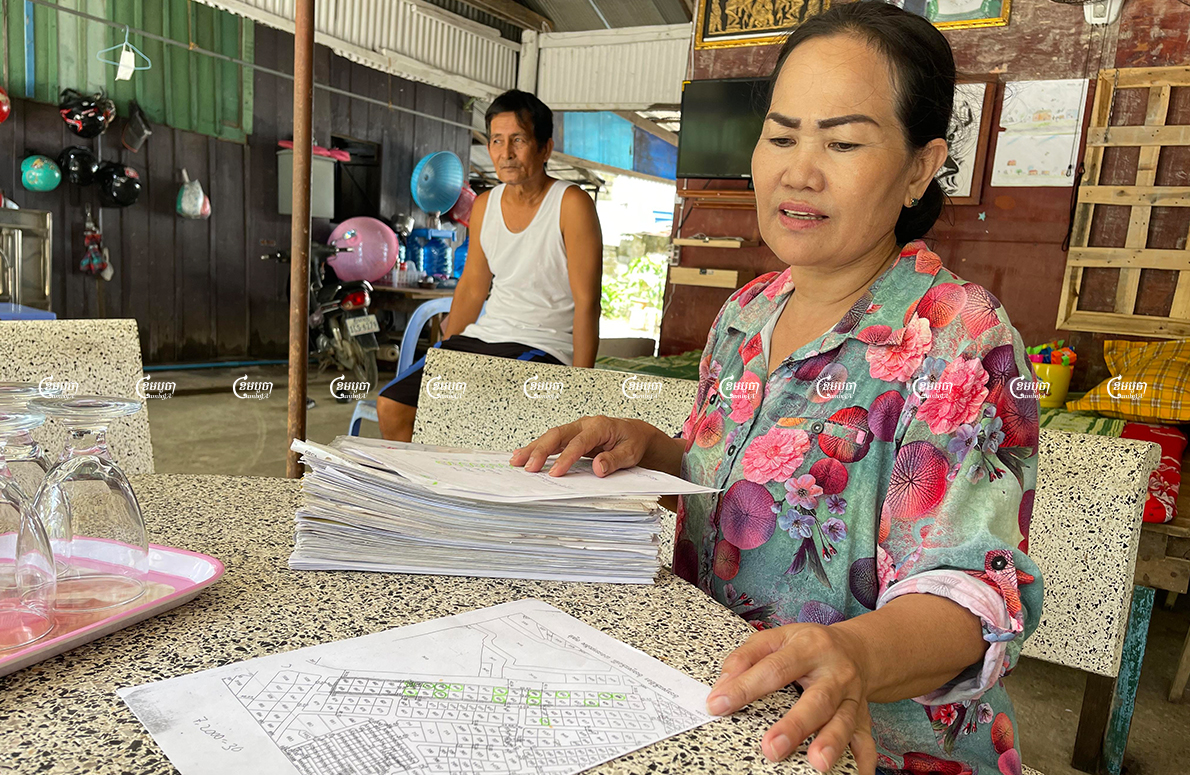
According to Chinda, more than 90 families were originally affected by the evictions, but most of them were resettled elsewhere based on provincial policy. That left only the remaining 24 families who have so far not been provided with a solution they can accept.
She said the affected families have since 1996 sought intervention from all levels of state authorities, including Prime Minister Hun Sen, but have been unsuccessful in their appeals. The case has, so far, passed through seven provincial governors, and the families said they plan to meet the current provincial governor, Kouch Chamroeun, when the COVID-19 situation is more stable.
The locals in the dispute said they’d met previously with Kouch Chamroeun in 2020, but he told CamboJA he was not aware of the issue and said the villagers should meet with their local authorities. Kan Leung, chief of Commune 3, could not be reached for comment.
In a letter response in 2002 to the affected families who had sought intervention from local authorities in that year, Kan Leung had said commune authorities were unable to resolve the land dispute.
While the land is now in a central Sihanoukville business hub characterized by mostly Chinese-owned casino establishments, Chinda said the involved families would at least demand compensation for the property.
“When more Chinese came to Sihanoukville, the price of property was going up. We faced more challenges, and when we protested, we were arrested and jailed,” she said. “If they want to arrest me and put me in prison again, I can do nothing. But when I come out, I will continue to demand, it is my land.”
She said people remain hopeful for a favorable resolution as the land has been left unused and undeveloped.
“I believe that if there is no agreement or any compromise from affected families that have been locked in this land dispute, other parties also cannot do something on this land while both [authorities] and court have still not decided on it.”
Chinda and other affected villagers have faced many lawsuits, at least one of which is ongoing, from different individuals who claim to have purchased the land from the Thai Boon Roong company. In 2002, five of her family members, including her parents, were imprisoned for nearly a month as they pressed their claims to the land. In 2019, Chinda, with three of her relatives and two other villagers, was arrested again after protesting for their rights to the disputed land. The group was sentenced to two years in prison under charges of incitement to commit felony and extortion and ordered to pay $4,000 each in fines. The case was filed by Thai Boon Roong Group Chairman Khov Sambath.
Chinda was released in July this year and, after a civil case, she and four others who were arrested in 2019 have seen their fines reduced to $1,000 each.
The personal assistant of Khov Sambath rejected a request from a reporter to speak with the chairman. However, the assistant, who asked to go unnamed, said the land had already been sold years ago to someone else.
“They [company] already solved and finished the conflict. As I know, the company was not involved with the land anymore, the company already transferred [it] to other owners,” she said, adding that those who were jailed due to the company’s complaint were imprisoned with good cause.
“If they legally own the land, the company will pay them compensation. They wouldn’t have gone to jail,” she said. “They were jailed because they committed the crime.”
But the villagers’ commitment to their claims won’t be dismissed as easily as that.
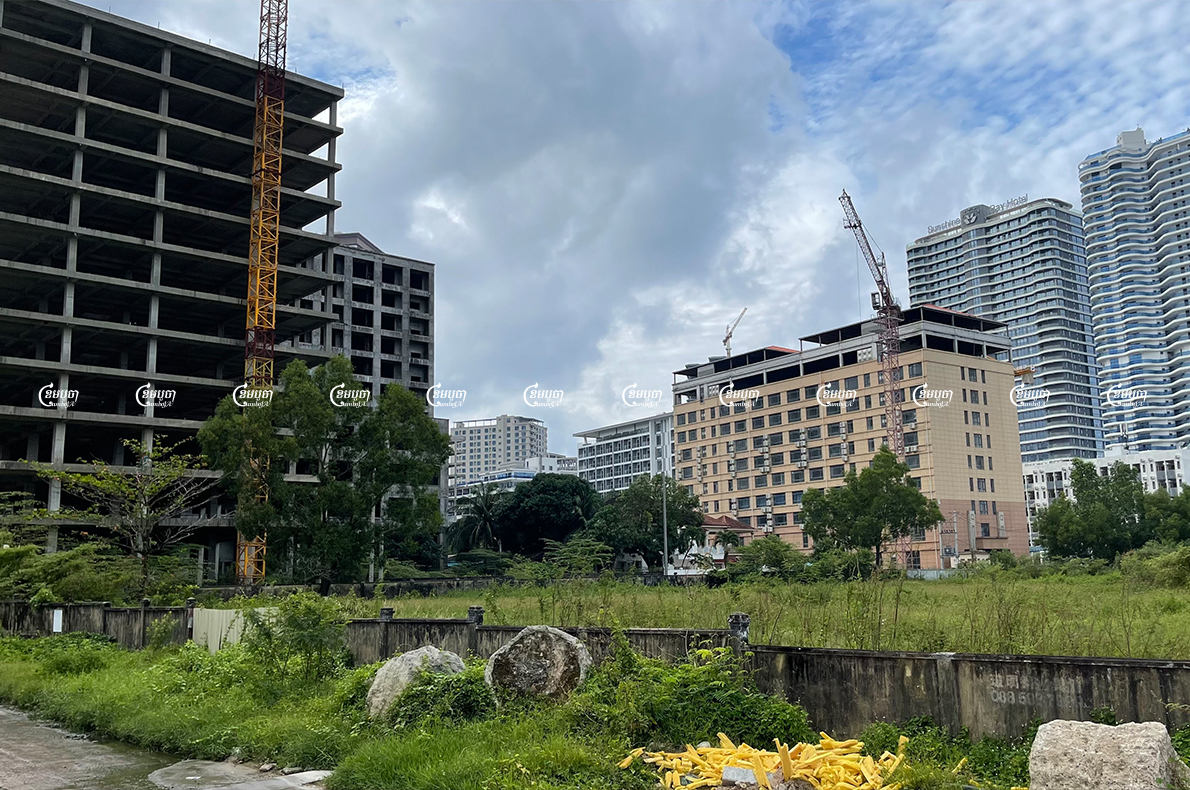
Former soldier Heng Yong, 52, is one of the people evicted from the disputed site 25 years ago. Since then, he’s lived with his family in a small floating house, which today is in a broken-down shape as it bobs on the sea.
Yong said the land had been left to him by his parents, who occupied 3,500 square meters for decades before the family was forced to leave in 1996.
“I have been living in pain now, I used to struggle to defend the country when I was a soldier, but now I cannot even protect and take care of my land,” he said. “What do I live for? I’m in pain, I do not want to talk about this.”
Yong was one of the group sentenced in 2019 to two years’ imprisonment for incitement after joining protests with other families. That experience hasn’t shaken his resolve.
“It’s my family’s land, and I will continue to demand it until the end of my life,” he said.
Neth Sarin, 70, says her family’s presence on the land runs back to the earliest years after the end of the Khmer Rouge regime. She was moved to Preah Vihear province after her family was forcibly evicted in 1996 but told CamboJA she still travels back to the disputed land to join with the other families in their campaign.
Sarin, who claims she originally occupied 2,240 square meters of land, said her family had cleared land for farming at the site since 1980.
“I only want the land back, but if they do not return the land and settle for it with money, it would be acceptable,” she said. “I think my land may be taken by powerful people, but there is still hope because this land has been ours for a long time.”
She said in 1996, authorities had accused the families of illegal settlement on state land and required them to leave without compensation. That eviction set more than two decades of struggle into motion.
“We would like to appeal to the relevant authorities to help find a solution. If [we] cannot retake the land, we just need decent money in exchange, without compensation is unacceptable,” Sarin said.
Am Sam Ath, deputy director of monitoring at the rights group Licadho, said the Village 1 land dispute is the longest land-grabbing issue in Sihanoukville.
“We recognize the difficulty in solving the issue because it has been prolonged for years, but one solution should be made to finish it,” he said.
Sam Ath said the lack of a clear state mechanism to officially resolve disputes means the case is not an isolated issue. Many similar instances of land grabbing have occurred across the country and in Sihanoukville, Sam Ath said, which has become a hotspot for such conflicts over land.
“If these issues are not solved properly, we are concerned that violence and arrests will continue and will become a social crisis,” he said, adding that the growing price for real estate in the province is a key driver of disputes such as that of Village 1.
Based on the law, Sam Ath added, all property transactions require both buyers and sellers to clearly know the background of the land to avoid disputes. He said the Ministry of Land Management has previously terminated many irregular land titles.
In Village 1 and elsewhere in Cambodia, land disputes have continued even under the crisis of the pandemic, during which authorities have been accused of using public health measures to silence freedom of expression.
Licadho stated that ongoing land grabs have affected more than 5,000 families in the past two years, showing no signs of slowing despite social restrictions.
Instead, the group has found the opposite.
“The arrests and jailing of land community members and activists has increased over the past two years, and as of October 2021, there are at least 21 land community members and activists who have been arrested, with 10 people imprisoned,” Licadho said in a statement.
Even though Licadho has not produced a full report on land grabbing during the pandemic, the rights organization released a short video on the subject on October 17 to celebrate World Habitat Day.
For the video, Licadho staff interviewed some community members affected by land grabbing. Those individuals said that while they were affected by COVID-19, they still needed to struggle to exercise their fundamental rights and freedoms as related to land tenure.
That same spirit is evident in Sihanouville’s Village 1.
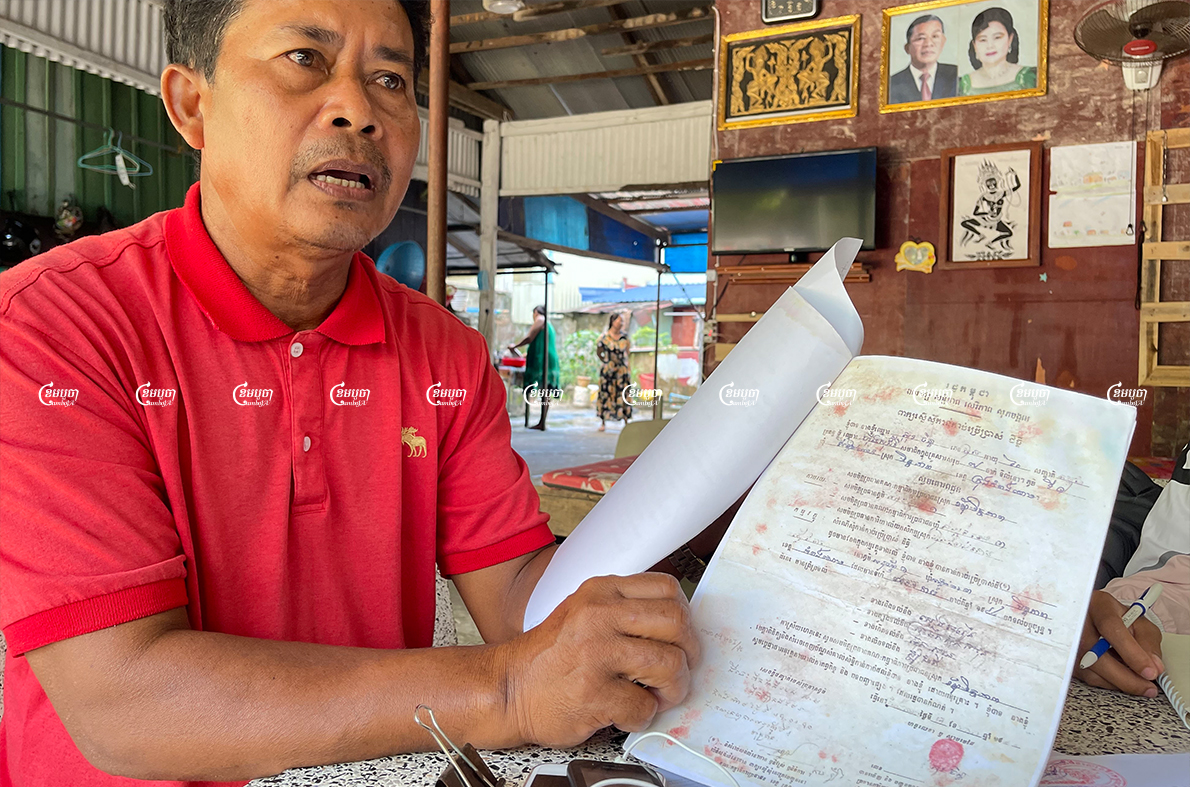
Sieng Saroeun, 53, another member of one of the families affected by the land dispute, said the fight wasn’t just about the money. At the same time, he was struck by how much the hot real estate market had changed the situation. “We have been protesting since 1996, before the presence of Chinese here.
We have made our demands since the land was not worth much,” he said. “I never thought I would come to protest because of the rising price of land with the arrival of the Chinese.”


